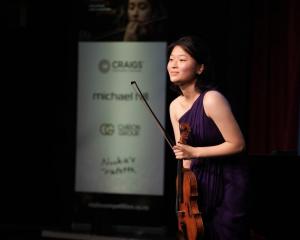Living, working and travelling together does not faze musicians Nicola Benedetti and Leonard Elschenbroich. The pair tell Rebecca Fox about their shared love of music.
She has been called the Scots violin queen; he a star in the making.
Violinist Nicola Benedetti and cellist Leonard Elschenbroich have a closeness of musical aesthetic.
‘‘So playing together and being together stem from the same feelings,'' Elschenbroich says.
The pair will perform in Dunedin tonight as part of the New Zealand Symphony Orchestra's ‘‘Brahms & Beethoven'' tour.
‘‘It's a beautiful country and I'm excited to see more of it this time around,'' Benedetti said.
It will be her first time working with the NZSO's new music director Edo de Waart on his debut season which explores some of the most important orchestral works by great composers.
‘‘I am hugely looking forward to working with him.''
Benedetti, who was born in Scotland of Italian heritage, made history as an 8-year-old by becoming the youngest person to lead the National Children's Orchestra of Great Britain.
At 16 years old, she won the 2004 BBC Young Musician of the Year Award which led to a lucrative six-album deal from Universal Music that same year.
She has gone on to a successful career, winning the best female artist at the Classic Brit Awards in 2012 and 2013, and performing at the opening ceremony of the Commonwealth Games in 2014.
Her recording Homecoming: A Scottish Fantasy made her the first solo British violinist since the 1990s to enter the top 20 on the United Kingdom's official album charts.
In 2013, she was appointed a Member of the Most Excellent Order of the British Empire in recognition of her international music career and work with musical charities.
It all began for her when, as a 4-year-old growing up in West Kilbride on the west coast of Scotland, she wanted to emulate her older sister.
‘‘I copied everything she did at that stage.
''She now plays the 1717 Gariel Stradivarius, on loan from Jonathan Moulds.
Her passion for music has continued and she is committed to music education and developing young people's musical talent, becoming Scotland's official ‘‘Big Sister'' for the Big Noise project in 2010.
She developed her own outreach and education initiative, The Benedetti Sessions, in 2013 to give aspiring string players the chance to rehearse, undertake and observe masterclasses, culminating in performing alongside Benedetti.
Benedetti sessions have been presented at the Royal Albert Hall and Cheltenham Festival.
She met Elschenbroich at the Yehudi Menuhin School in Surrey, where they both studied music. Elschenbroich was born in Frankfurt. He received a scholarship when he was 10 years old to study at Yehudi Menuhin School.
His mother encouraged him to play the cello when he was 4, but he ‘‘hated'' it.
‘‘When I was 5, I really liked it. I'm not sure if I've just grown into a cellist or if I was meant to be one. A little of both, maybe.''
He has received many awards, and was accepted into the BBC Radio 3 New Generation Artists Scheme in 2012. He was also named artist-in-residence of Deutschlandfunk for 2014-15.
Elschenbroich, who plays a 1693 cello made by Matteo Goffriller ‘‘Leonard Rose'', on private loan, has also been artist-in-residence at the Philharmonic Society Bremen since 2013.
He was a supporter of contemporary work and had commissioned several new works from composers. Next year, he will present the world premiere of Mark Simpson's first cello concerto with the BBC Philharmonic Orchestra under Juanjo Mena.
Like his partner, he is passionate about encouraging a love of music, and in 2012 became the artistic mentor of Bolivia's first national orchestra. He returns regularly to South America to perform with the orchestra, as well as leading education projects.
Together, Elschenbroich and Benedetti with pianist Alex Grynyuk formed a trio in 2008. Their instruments complemented each other.‘‘There is a male/female voice polarity to the pairing and it happens to match our genders. Not a must but I think it makes it easier,'' Elschenbroich said.
Together with an orchestra, the pair have only done two major works - the Brahms Double and Beethoven Triple.
‘‘We love to play trios by Tchaikovsky, Brahms and Beethoven.''
Commenting on the couple's recent performance with the Tasmanian Symphony Orchestra, one reviewer (for Limelight magazine) said that they were a couple was obvious on a visual level but their ability to perform with such a well-matched interpretation of Brahms ‘‘perhaps hinted at their closeness''.
‘‘At no point did the two appear competitive, but complemented each other tastefully while paying respect to the subtle nuances in their lines. This combination of young talent produced a show-stopping performance.''
A British reviewer on Bachtrack described one of their Brahms performances: ‘‘The two soloists were wonderfully matched, their music played to and for each other with the melodic lines entwined like the limbs and souls of lovers, a communication enhanced by both soloists playing from the same music stand.''
Like all musical careers, there have been times when things have not gone to plan.
‘‘The funniest was when a conductor smashed his baton on the stand with his upbeat to the first tutti. It went flying through the air and I could hear the whole orchestra giggling behind me. I felt something in my hair. It was half of his baton.''
To see
NZSO: Brahms & Beethoven, Regent Theatre, tonight












